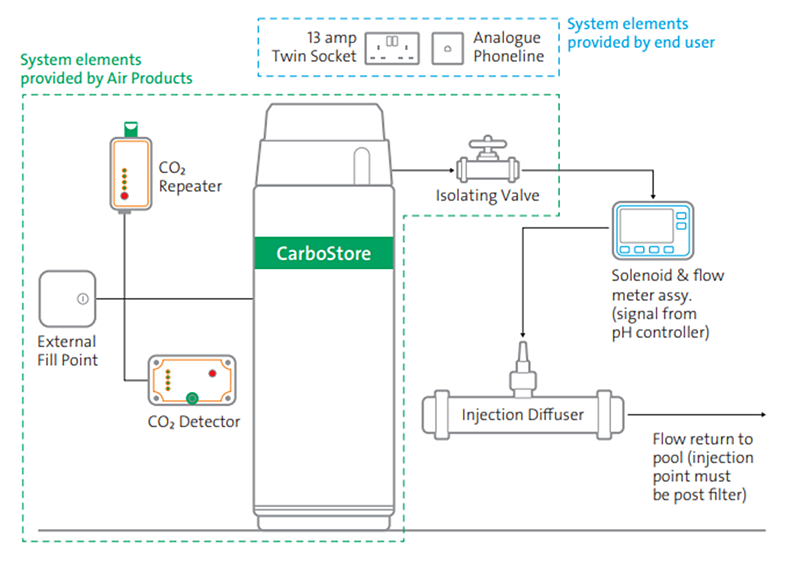Maintaining the correct pH level in swimming pools is essential to providing a safe, clean and enjoyable
environment for guests.
Chlorine is the most commonly used water treatment for swimming pools. Often, it is considered to be the most
effective treatment for maintaining the pH balance and disinfecting water, helping prevent the spread of
waterborne bacteria that could cause health issues, making it sanitary to swim in.
When added to water, chlorine - sodium or calcium hypochlorite - has a chemical reaction
that creates two
chemicals, hypochlorous acid and hypochlorite ion. Combined, they form free chlorine that kills bacteria and
makes pools safe to swim in.
The effectiveness of free chlorine is determined by the pH levels of the water, which in turn, dictates the
balance between the two newly formed chemicals.
For a swimming pool to be safe to swim in, the Pool Water Treatment Advisory Group (PWTAG) recommends that water
pH level should be between 7.2-7.4.
If the pH levels are too high, the water isn’t acidic enough. When it’s too low, it’s too acidic. Anything
outside of the recommended levels pose a health risk to swimmers, along with being potentially damaging to the
pool facilities.
Whilst being an effective disinfectant when balanced correctly, exposure to the incorrect balance and chloramines – the chemical created when chlorine mixes with organic matter - can lead to several unpleasant side effects:
Pool operators are required under COSHH to carry out assessments to protect staff and visitors against health
risks from exposure to hazardous substances in the workplace. From there, the pool operators decide what
precautions are necessary to prevent or control exposure.
Avoiding exposure to chlorine is the most effective way of preventing chlorine-related health issues.
There are alternative swimming pool water management solutions that are equally as effective at maintaining pH
levels and the cleanliness of pools, without exposing swimmers and staff to potentially harmful chemicals.
One of those alternatives is carbon dioxide (CO2).
CO2 eradicates the risks associated with chlorine in swimming pool water.
It works by forming a mild carbonic acid that is safe and has the same neutralising capacity as strong acids such as hydrochloric acid. Additionally, it creates natural bicarbonate buffer, that stabilises pH levels.
Let's dive deeper into the safety benefits of using CO2.
There are no harsh chemicals involved when using CO2 in swimming pools. As such, unpleasant side effects and potential risks of burns, skin and respiratory irritation from overexposure to chlorine is eliminated for bathers, whilst chloramines are reduced.
Additionally, and as importantly, the risks of handling chlorine by employees are removed. COSHH legislation exists to protect workers against risks from hazardous substances at work. The first obligation is to prevent risks and only when this is not possible then to control exposure. CO2 allows swimming pool management to remove the risks of chlorine with no adverse impact on their water treatment.
When using chlorine in a pool, someone must manually handle the chemical whether that be carrying it or diffusing it in water. This increases the risk of spillages, burns and other injuries.
CO2 swimming pool water treatment systems reduce those risks. Solutions such as CarboStore™ from Air Products operate independently, removing any requirement for manual handling or management upon delivery.
CarboStore™ works by diffusing CO2 at a gradual and consistent rate, helping to keep the pH level stable in the pool water.
When the tank is running low on CO2, the integrated telemetry system will send a signal to Air Products for a refill. As the tank refill point is sited externally to the pool building, deliveries are conducted by Air Products, without interaction from pool staff - even out of hours. This makes CO2 water treatment systems like CarboStore™ a safer, more efficient and more productive solution than chlorine.

Whilst chlorine is still the most popular method of maintaining pool pH levels and cleanliness, it's certainly not the safest solution.
With safety and customer experience increasingly at the forefront of the water leisure industry's mind, there are cost-effective alternatives to provide a safer, chlorine-free swimming experience for both bathers and staff.
No chlorine, no problem.
Air Products is a global leading industrial gas supplier and specialists in swimming pool pH control systems. If you are interested in exploring how we could help you switch from chlorine to CO2 and provide a safer swimming pool environment, please get in touch using the form below: